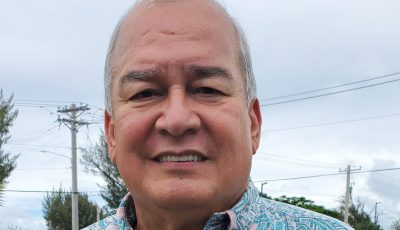Torres tells US Senate of NMI’s COVID-19 challenges
Gov. Ralph DLG Torres brought the CNMI’s issues related to the COVID-19 pandemic to the U.S. Senate in order to apprise it of how it is affecting U.S. territories.
In a written testimony to U.S. Senate Committee on Energy and Natural Resources during a hearing last June 30, 2020, in Washington, D.C., Torres laid out all the initiatives the government has done—from his declaration of a state of significant emergency in January, up to the widespread community based testing covering 15% of the CNMI population, one of the largest relative populations tested in the nation.
The committee hearing, which intended to examine the impact of COVID-19 on U.S. territories, also heard from Torres the economic downturn the CNMI is experiencing as a result of the pandemic.
“The dramatic fiscal shortfall resulting in from the elimination of the CNMI’s sole industry will have deep and lasting impacts to the lives of our people for years to come.”
While recognizing that the unemployment assistance programs and the economic impact support payments have eased the suffering of a lot of people in the CNMI, Torres said “the path ahead is still presenting a cause for serious concern.”
The relief given to state budgets through the CARES Act supported the large and unexpected expenses the CNMI had to spend to respond to the urgent health care needs of the population, Torres said, but much is needed in government resources to retain viability of government operations.
“…The CNMI budget was reduced in half due to the loss of resources in the later months of this fiscal year. With no certain end to this pandemic in sight, the future for the CNMI’s tourism industry, and government income derived from this economic activity is bleak,” he added.
Municipal Liquidity Facility not accessible
Torres pointed out that critical components under the CARES Act, which were intended to support government services, are not made available to the territories, particularly the Municipal Liquidity Facility.
The MLF allows for the issuance of municipal debt to special purpose vehicles operated by the federal government to cover, among other things, the reductions of tax and other revenues, related to or resulting from the COVID-19 pandemic.
“It is apparent that this program has been deemed inaccessible to territorial governments and the lack of access to financial tools such as these greatly impacts the government’s ability to finance necessary obligations in the environment of severely limited revenues,” he said.
The governor informed the senators that the CNMI has showcased its commitment to downsizing government operations through furloughs and deep austerity measures, but “we can only cut so much before the residents of our community will further experience disproportionately the impacts of this crisis in levels unseen in communities in the mainland United States.”
In April, the CNMI was forced into “the most austere budgetary practices in recent history,” reducing government work hours to 64 hours per pay periods, and the furloughing or impacting of approximately half of the government workforce.
Pension program
By far, the biggest and most concerning obligation of the CNMI is its obligations to the CNMI’s pension program, as outlined in the Settlement Agreement with the U.S. District Court, Torres said. That settlement requires mandatory minimum payments to the Settlement Fund to ensure continued benefits for the CNMI government’s retirees.
This year, according to the governor, the $44 million obligation is the largest single item of the Commonwealth’s budget.
“Efforts have been made to safeguard this payment while allowing flexibility within the CNMI’s finances for this trying period. …The CNMI, however, cannot at this time offer the financial markets the security necessary to obtain affordable financing options.”
The governor attributed this to the structural deficiencies of the CNMI economy due to the islands’ size and location, and the persistent risks of external threats such as typhoons, tourism volatility, and negative ramifications of federal government actions and policy.
Lack of resiliency
Torres also raised that not is the “appropriate time” to fully commit to discussing the economic development policy of the U.S. government as it relates to the territories. “This crisis has showcased that the territories lack resiliency in our health care systems and our economies to withstand regional and global crises, and our residents and citizens are forced to contend with greater challenges and less resources than their mainland counterparts.”
While recognizing the federal government agencies and departments that aided the CNMI in its fight against the pandemic, the governor added that “laws and regulations exist within the federal government that make the foundations of our community weaker to withstand these threats alone.”
The governor laid out the challenges of operating a health care system that is geographically remote, the CNMI’s fragile economic health, and the overwhelming rise in the burden of chronic disease among the local population. “Despite these challenges, the CNMI and other territory health systems have largely been left out of reforms and improvements to the Medicaid and Medicare programs. …Exclusion from these programs shut out territory hospitals from eligibility in other programs such as the 340B Drug Discount Program and the Medicare EHR Incentive Program.”
Further, he also raised that programs, such as the CARES Act’s Payroll Protection Program, was inaccessible to many small businesses in the CNMI due to the limited access to banking services.
Many of the local banks are headquartered outside the CNMI and local branches had to compete with slots for local applicants, against applications in larger economies of Guam and Hawaii.
In closing, the governor asked the Senate to consider the issues the Commonwealth is facing. “I ask for your consideration of these circumstances, and for your continued interest in viewing the efforts performed in the past months in the CNMI as an example of our interest in building and protecting the lives of our American citizens living in this region of the world and of the possibilities that are possible through collaboration and understanding.”
“We will overcome these challenges and I pray that our people will remain strong, resilient, and
healthy throughout these trials,” he stressed.



























